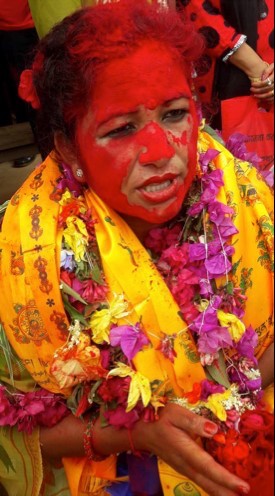Thanks to constitutional and legal provisions that introduced compulsory quotas for women in different posts in local governments, as well as intensive campaigns for women’s engagement in politics carried out by the Election Commission Nepal with the support of UNDP’s Election Support Project, a record number of women have won seats in the first two phases of the local-level elections.
Fatteh Kumari Jaisi was elected a woman ward committee member in Khajura Village in the recent local polls, while Man Kumari Gharti Magar became the new Deputy Mayor in Rolpa municipality. Pabitra GC, on the other hand, was chosen woman ward committee member for Pyuthan, and Surma Sarki elected as the Dalit woman ward committee member in Jumla’s Tatopani Rural Municipality.
All these women might hail from different geographical and social backgrounds, but they have one thing in common: all four were among the 45,000 participants of a programme to encourage the political participation of women conducted by the Election Commission Nepal (ECN) with extensive support from UNDP’s Election Support Project (ESP).
Across the two phases of the local elections, 11,630 women have been already been elected, and a third phase is yet to be held. Never before in the country’s history have such a large number of women won seats in local elections like they have done this time around. Overall, elected women comprise 41% of representatives.
Much credit for this goes to the constitutional and legal provisions that introduced compulsory quotas for women in different posts within local governments. The Local Level Electoral Act 2017 has reserved two seats on each of the nearly 7,000 ward committees for women, one of which is for women of the marginalized Dalit caste. In addition to this, political parties that present candidates for both the positions of Mayor and Deputy Mayor in municipalities, and Village Chairperson and Village Vice Chairperson in rural municipalities, have been mandated to include at least one woman candidate among the two.
Despite the clear push by legislation, taking up the opportunity in reality has not been quite so easy for women, particularly Dalit women, on the ground. Lack of necessary information about legal provisions, their rights, electoral procedures, among other aspects, have hampered their rise into positions of leadership. Parbati Sanu Dangi, elected Deputy Mayor of Myanglung Municipality in Terhathum, shares her experience. “I had a tough time getting the ticket,” she recalls. “Even after I got the ticket, I still had to fight and struggle with both male and female candidates.”

It was in this context, with the objective of narrowing the gap between the intentions of the legal provisions and the knowledge of the target groups, that the ECN and ESP had set up and implemented a specific voter and candidate education programme in April 2017.
These campaigns were aimed at raising the awareness of local women, particularly from the Dalit and other marginalized communities, regarding their constitutional rights of representation in local bodies, and motivating them to participate in the polls, both as voters and candidates. The programme also contributed to strengthening women’s leadership capacity to ensure their engagement with politics would be meaningful.
“I was not aware that I had a leader inside me. The orientation programme helped to bring it out,” says Bindu Pariyar, elected Dalit woman ward committee member of Pyuthan Municipality.
For this, the ECN and ESP had partnered with Nepal’s National Administrative Staff College and jointly organized a Master Training of Trainers in Kathmandu. The graduates of the training sessions conducted district-level trainings for facilitators, who were recruited and supervised by UNDP-contracted local NGOs, and monitored the successive orientations at the grassroots level. In this way, within a matter of days, nearly 2,000 orientations were conducted, reaching around 45,000 women, Dalits and marginalized voters.
With such training programmes being carried out simultaneously in 26 districts, the ESP team, ECN officials, and representatives of partner NGOs, were unable to by physically present in all program areas for monitoring of the interventions. Monitoring was therefore conducted through a dedicated mobile SMS reporting system and random visits to the areas where the orientations were being held.
Deepak Subedi, Joint Secretary at the ECN, expresses his confidence in the effectiveness of the programme in raising awareness among women of different backgrounds and encouraging them to take a more active interest in politics. “We have used our resources to their fullest potential,” he says.
In addition to helping target groups understand the legal and financial implications of the election, the programme also helped them form women’s groups in the community and work together in the election campaign.
The elected women are grateful for the support they have received, but point out that there is much more ground to cover in the days to come. “Women candidates were limited just to the Deputy-Mayor and Vice-Chair positions in the first and the second round of the local polls,” says Myanglung’s Parbati Sanu, “Political parties should have the confidence to file candidacies of women for the posts of Mayor and Chairperson in the upcoming local elections.”
Photo Credits: UNDP Nepal
The Electoral Support Project- Phase II (ESP) is a technical assistance initiative which focuses on a long-term institutional and professional capacity development of the Election Commission (ECN) for conducting credible, inclusive and transparent elections. The objectives of the project are 1) to strengthen the capacity of the ECN to function as an independent and credible institution, 2) to allow the conduct of the election cycle in an effective, sustainable, and credible manner, and 3) to increase democratic participation, particularly for under-represented and disadvantaged segments of the Nepali society. ESP is currently funded by EU and Norway.
